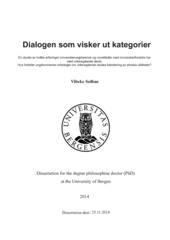| dc.contributor.author | Solbue, Vibeke | |
| dc.date.accessioned | 2015-01-12T11:51:58Z | |
| dc.date.available | 2015-01-12T11:51:58Z | |
| dc.date.issued | 2014-11-25 | eng |
| dc.identifier.isbn | 978-82-308-2803-8 | eng |
| dc.identifier.uri | https://hdl.handle.net/1956/9108 | |
| dc.description.abstract | The aim of the thesis is immigrant youth and Norwegians born to immigrant parents in upper secondary school in Norway, and how this group of students experience their daily life in school. The thesis examines whether immigrant youths and Norwegians born to immigrant parents in upper secondary schools are met with equity in their everyday life in school. The main research question of the thesis is: What can students’ experiences when meeting upper secondary school tell about how school meets immigrants and Norwegians born to immigrant parents? Three sub-questions are: 1. How can a researcher work with her prejudices and her preconceptions when meeting informants belonging to a foreign context? 2. What experiences do immigrant youth and Norwegians born to immigrant parents have with upper secondary school? 3. What can we learn from students’ experiences in an inclusive classroom environment? The fieldwork was conducted in two phases. The first part of the fieldwork was conducted in an upper secondary school with vocational programs, where all teaching for two weeks in two different classes was observed. In one class there were 14 students, four of whom were immigrants and Norwegians born to immigrant parents. In the second class there were 12 students, four of whom were immigrants and Norwegians born to immigrant parents. After the observation period, a total of six students with immigrant backgrounds were interviewed. The second part of the fieldwork was conducted in an upper secondary school with general studies programs. I observed a class of 24 students in two to three hours three days a week for three weeks. 11 of the students were immigrants or Norwegians born to immigrant parents. 19 students of the class were interviewed. An important component of this thesis is the researcher’s reflexive process. In order to progress in the analysis from the first fieldwork, I engaged in a meta-reflexive process in collaboration with a research colleague who read all the data and interviewed me to help me reveal prejudices and attitudes that prevented me from reading the data with a less personal perspective. The main results of the thesis can be organized in three different classes. The reflexive work follows all the classes. The reflexive process shows the importance of being challenged by a colleague/ critical friend in a research community to get an understanding of my own prejudices when meeting the field data and material and thereby gain greater insight into my own attitudes. The method developed is an important stage in the thesis, and is in itself a sub-finding. It shows the value of a research community that shares a common interpretive zone to challenge the researcher’s beliefs and prejudices. The main finding of this study is the understanding of the environment in the three classes, based on student’s experiences. The three classes can be categorized as a monologic class, multicultural class and intercultural class. The monologic class is characterized by a monologue-like communication between the participants. There is a clear distinction between ethnic Norwegians and immigrants. Immigrants are in a peripheral trajectory in the community of practice in the class. They will not be in an insider trajectory of the community. The characteristic of the multicultural class is that the class is based on a multicultural educational profile. There is no distinction between ethnic Norwegians and immigrants. The immigrants are in an insider trajectory in the community of practice in class together with the ethnic Norwegians. Since the class is characterized by a multicultural educational profile, it is based on the categories of ethnic Norwegians and immigrants. The intercultural class is based on a multicultural education, but places great importance on relational factors. It is not based on categories as ethnic Norwegians or immigrants. In intercultural education inter-subjectivity and dialogue are emphasized, both of which are essential factors to provide an equal education based on equality. | en_US |
| dc.language.iso | nob | eng |
| dc.publisher | The University of Bergen | eng |
| dc.relation.haspart | Paper I: Solbue, V. (2011). In search of my hidden preconceptions as a researcher. Reflective Practice, 12(6), 817-82. Full-text not available in BORA. The published version is available at: <a href="http://dx.doi.org/10.1080/14623943.2011.609248" target="blank">http://dx.doi.org/10.1080/14623943.2011.609248</a> | eng |
| dc.relation.haspart | Paper II. Solbue, V. (2013). Praksisfellesskap innvandrerungdom erfarer i møte med videregående skole. Utbildning & Demokrati 22(2), 59-80. The article is avalible here: <a href="http://hdl.handle.net/1956/9109" target="blank">http://hdl.handle.net/1956/9109</a> | eng |
| dc.relation.haspart | Paper III: Solbue, V., Helleve, I., Smith, K. (2014). “In this class we are so different that I can be myself!” Opportunities in diversity in a first grade upper secondary school in Norway. Revised version under review in Journal of Intercultural Education. Full-text not available in BORA. | eng |
| dc.title | Dialogen som visker ut kategorier: En studie av hvilke erfaringer innvandrerungdommer og norskfødte med innvandrerforeldre har med videregående skole.Hva forteller ungdommenes erfaringer om videregående skoles håndtering av etniske ulikheter? | eng |
| dc.type | Doctoral thesis | |
| dc.rights.holder | Copyright the author. All rights reserved | |
